- Home
- Richard Lee Byers
The Masked Witches Page 4
The Masked Witches Read online
Page 4
So Jet simply—and mischievously—screeched a greeting as he flew overhead. Griffons below cried in response and restlessly shook out their wings. Their keepers scurried about, calming them and making sure they wouldn’t try to take flight and join their fellow in the sky.
Jet found the feral but ensorcelled griffons, the ones the Rashemi presumably meant to sell, prowling on the white hillsides farther to the east, or soaring and circling above them. His eyes widened at their numbers. It was astonishing that they’d bred or been captured in such profusion, and he had little doubt that wizardry or the whim of a god was involved.
In any case, magic was surely responsible for holding them where they were. As Jet flew nearer, a kind of crackling rawness in the air prickled across his body, while colors brightened or dimmed from moment to moment. A human female in a green robe strolled fearlessly among the huge beasts on the ground. She lifted her masked face to watch his approach. Perhaps it was her task to renew the enchantment and keep it strong.
Jet wondered if he should turn around lest the spell snare him, too. But he didn’t feel any compulsion trying to squirm into his mind. And besides, if the magic did take him prisoner, Aoth would surely set him free. He flew on for a closer look.
The witch didn’t try to stop him. But one griffon gave a rasping scream, lashed his wings, and leaped up from the ground.
Thanks to Aoth’s benign enchantments shaping him from the moment of conception, Jet was different than any normal creature of his kind. Not only was he more intelligent and capable of speech, he was bigger and stronger, with gleaming black feathers and fur and crimson eyes.
For the first time, Jet was looking at a griffon as extraordinary as himself. In fact, the other beast was even larger, with gold-striped wings and brilliant blue eyes instead of the usual yellow.
Since the Rashemi had just taken the beasts from the wild, Jet doubted that a spellcaster had altered the creature. Rather, the magic of that strange northern land itself—where animals talked, and every creek, bush, and tree supposedly housed a guardian spirit—must have shaped him into the superior being he was.
A superior being who didn’t like Jet. Climbing to the same altitude, the gold griffon screamed again, and the rage and challenge in his cry were unmistakable.
Jet understood why. In the wild, griffons were often solitary except when mating or raising cubs. But in areas where game was plentiful, they sometimes formed prides. And of course when they served as mounts for aerial cavalry, they were obliged to live in groups.
In such situations, one griffon generally rose to dominance. And evidently the blue-eyed creature saw Jet the newcomer as a potential threat to his ascendancy.
Jet considered how best to respond. He was still pondering when Aoth spoke to him mind to mind.
We’re flying east out of Immilmar, his master said. Come join us.
Stay in my head, said Jet, wheeling. Guide me to you.
I will, Aoth answered with a hint of humor, but I don’t think you can miss us. It’s quite a procession.
As Jet finished turning, the blue-eyed griffon screamed at what no doubt resembled a display of fear. Other beasts gave vent to their own rasping, scornful cries. Their wings snapped as they flew after him.
A wave of fury swept through Jet. He longed to turn again and prove his strength and courage by tearing the griffon with the gold-streaked wings to shreds. He could savage the whole pride if necessary, until the bloodied survivors cowered before him.
But that was a beast’s impulse. Jet was more than a beast, and Aoth needed him. He raced onward. Unable to leave the confines of their invisible cage, the wild griffons soon gave up the chase.
* * * * *
Cera had grown accustomed to riding on Jet, but soaring along across the sky with only “the wind” supporting her was unsettling. Her body kept tensing, certain she was about to fall.
Her mind knew better, of course. Jhesrhi, who had at some point extinguished her mask of fire, might be a morose and taciturn companion—and never more so than in recent weeks—but she was still a faithful friend and a true adept at elemental magic. She wasn’t going to drop anybody.
Cera tried to distract herself by looking around. Aoth was scowling, although probably not because he was worried about a fall. He had magic bound in a tattoo that would ensure a soft landing even if that happened. He just didn’t like not being in control.
Vandar’s beadwork vest fluttered and clinked faintly in the breeze. He had a clenched look that suggested he was afraid but determined not to show it. Or maybe he just didn’t want to shudder and have his teeth chatter in the cold. For various reasons, his three companions were either impervious to winter’s chill or could at least render themselves resistant. But the berserker had no such advantage. Cera murmured a prayer to the Keeper to warm him.
Farther away, the Storm of Vengeance swept along under sail, including the folding winglike constructions of canvas and wood now projecting from the sides of her hull. The skyship creaked and groaned like a common vessel at sea, and crewmen clambered as nimble as squirrels in her rigging. Mangan Uruk peered ahead from the bow, with Mario Bez at his side.
All around, to the right and left and above and below, twenty or so Aglarondans urged their griffons onward, with shouts and light taps from the butts of their lances.
By the Yellow Sun, it all made for a glorious spectacle. Cera didn’t only love Aoth because her association with him had led her to wonders and excitement that, as a priestess in a quiet market town, she had never imagined she might experience. But she suspected that was a part of it, even though the wonders and excitement had a nasty habit of turning into terrifying danger.
Could she give all that up? Give him up? She didn’t want to, but, because of the part she’d played in destroying Tchazzar and driving out the wyrmkeepers, her peers might well seek to proclaim her sunlady of all Chessenta. That honor would tie her to the realm for the rest of her life, while the day was bound to come when Aoth and the Brotherhood of the Griffon would move on.
And if she was offered poor Daelric Apathos’s office, what else could she think but that it was Amaunator’s will? And such being the case, how could she justify turning her back on the god’s plan for her?
Cera had agreed to accompany Aoth to Rashemen partly because she hoped the journey would somehow help her see her path clearly. And if not, at least it was another chance to be with him, to make memories she could cherish during what might be lonely years to come.
“There!” Aoth said, jarring her from her reverie. He pointed with his spear.
To the south stood a snow-shrouded stand of oaks and pines, like a detached bit of the great forest Ashenwood, visible as a distant dark mass. A couple of huts stood among the trees, and that was about as much detail as Cera could make out. She surmised, though, that Aoth had spotted signs of trouble, and that was why he was certain that was their destination.
Jhesrhi spoke words in what Cera assumed to be the language of the wind, and they swooped over the grove for a closer look. Flying felt even more like falling. But it only gave Cera a momentary twinge of fear, probably because she was too busy peering for actual danger.
Though she didn’t see any, she did spot three witches and an enormous fox sprawled motionless in the cleared area in front of the huts. One of the women wore a white robe and a mask with a single horn jutting from the brow. She’d apparently pledged herself to the goddess Mielikki, the Forest Queen. Another had on brown and green, and a circlet of little red rosebuds that must have flowered for her in the midst of winter to crown her as a hathran of Chauntea, the Earthmother. The last witch lay cloaked in black and silver and was likely a priestess of Selûne, the Moonmaiden.
Cera at first thought that the fox had been one of the attackers, but she saw that it was facing away from the witches. Such being the case, it seemed more likely that the animal had come to harm trying to protect them.
Cera looked to Jhesrhi. “Please, get me down there
,” she said. “Someone might still be alive.”
“Unfortunately, no,” Aoth said. “But we’ve learned all we can from up here.”
On Jhesrhi’s command, the wind let them plummet, slowing their descent at what seemed the last possible moment. Cera’s boots settled lightly in the snow, and she could see what Aoth had observed from on high. The bodies before her were withered and twisted, and already stank of rot despite the cold. She sighed in pity and disappointment.
When she looked up from the corpses, Aoth, Jhesrhi, and Vandar were peering about, their weapons at the ready. Their priority was to scan for hidden foes, not to examine the fallen. That, Cera reflected, was the difference between truly warlike folk and one who—no matter how many desperate exploits she survived—would always be a cleric and healer in her innermost heart.
With rasping cries and the rustling of wings, the griffons and their Aglarondan masters descended. Less agile in flight, her canvas wings partly folded, the Storm of Vengeance was still maneuvering to land beyond the trees while gradually floating lower in the process.
The Aglarondan half-elf with the old white scar creasing his cheek and tugging slightly at the corner of his mouth glared at Aoth. “All of you, step away from there,” he said.
“No,” Aoth replied. “Not on your order. This isn’t Aglarond, and you have no authority. If any of us does, it’s the lodge master here, until Mangan Uruk touches down.”
Vandar drew himself up straighter. “That’s true,” he said. “And I say we should be figuring out who committed this outrage, not bickering amongst ourselves.”
“Fine,” the half-elf snapped. He turned to his men. “We’ll work our way through the trees. See what you can find.”
As the griffonriders moved off, their mounts prowling beside them like faithful hounds, Aoth gave Vandar a nod. “Thanks for backing me up,” he said.
The berserker shrugged. “We agreed that, for the time being, we’d help each other,” he replied. I take it that Folcoerr Dulsaer doesn’t like you.”
“Is that his name?” asked Aoth. “I broke a contract with Aglarond once and fought on the side of its enemy instead. I guess he hasn’t forgotten.”
“And it doesn’t shame you to admit it?” Vandar asked, sneering.
“You don’t know anything about it,” said Aoth. “And anyway, it has nothing to do with what happened here. Let’s work on understanding that. Tell me about that tree.” Aoth pointed with his spear to indicate the one he meant.
It was a towering old oak, and Cera winced to behold its current state. The bark was flaking away, and patches of black, slimy rot were eating into the sapwood. The bare branches had twisted into unnatural shapes that reminded her of the contortions of the dead hathrans.
Vandar scowled. “It was the reason this place was sacred,” he said. “The reason the witches dwelled here. A wise old spirit lived inside it. If the oak’s been killed, I suppose the telthor has been, too.” He extended his hand and touched his heart in what Cera took to be a sign of reverence.
“So the point of all this was desecration,” she said. The thought made her neck muscles tighten in anger.
“Desecration and plunder,” said Aoth. “I doubt that all three of these women died without a wand or a staff in their hands. And you can see the huts have been ransacked.”
“What I don’t see,” Vandar said, “are clear tracks of anyone but the hathrans and the fox.”
“I noticed that, too,” said Aoth. “There are spells to erase a human’s tracks, but they run out of power after a while. That means the Aglarondans have the right idea. If we move out from this point, maybe we can pick up a trail. Cera, stay with me.”
She snorted. “I think I’ve proved I can take care of myself.”
“Well, I think you left your mace and buckler attached to Jet’s saddle,” Aoth said. “I understand you still have your magic, but even so, stick with me.”
“Yes, Captain,” she replied, smiling.
At first, they didn’t find anything but a dead, rotting owl possibly killed by a stray burst of the same malignancy that had slain the hathrans, the fox, and the sacred tree. But then Aoth oriented on a low, dark spot amid a tangle of roots, with a snow-covered hump in the ground behind it.
“That’s a hole,” he said. “And the lump behind it is some sort of old monument. See where the stonework shows through the overgrowth and the snow?”
“No,” Cera said, “but I’m sure you do. Did something climb out of the hole or crawl into it?”
“That I can’t tell. Any chance I can convince you to stay up here?”
“What do you think?” She whispered a prayer and moved her hand in an arc. A golden glimmer ran through her yellow glove. When she entered the dark, the leather would shine with captured sunlight.
“Stay close, then,” Aoth said. He lowered himself onto his belly and squirmed through the curtain of roots. In another moment, his voice came back to her. “I’ve found some stairs,” he called.
When Cera crawled through the roots, she saw steep, narrow steps descending into darkness beyond the reach of her conjured glow. Chunks of stone and bits of dirt littered the upper risers. Once, she surmised, a slab had capped the top of the stairway, perhaps covered with earth to keep it hidden. But something—possibly simply the weight of time, or the slow insistence of the growing roots—had broken it.
“Ready?” asked Aoth, keeping his voice low.
“If you are,” she replied.
Keeping his spear level, he headed downward. She followed.
The steps brought them to a place where one stone passage curved away to the right, its counterpart curved to the left, and a third one extended straight ahead. Rows of square slabs studded the wall, each graven with hieroglyphs that Cera couldn’t read. But in some places, there were no such stoppers, just empty holes revealing sockets the approximate size and shape of coffins.
“It’s a tomb,” Cera said.
“I think so,” said Aoth. “An old one, though whether Nar, Raumathari, or something else, I don’t know. Watch out for guardians and traps.”
She did, but as it turned out, she needn’t have bothered. If the dead had ever had a sentry, it had deserted its post or crumbled to dust along ago. Likewise, if there had ever been contrivances to drop an intruder into a pit or to pop a blade stabbing out of the wall, the mechanisms had stiffened and corroded into immobility.
The place turned out to be laid out in a circle, with two straight passages crossing in the center like the spokes of a wheel. At that hub, a sarcophagus carved with the form of a sleeping man in scale armor and an odd jagged crown reposed on a pedestal.
Aoth looked it over, then shrugged. “If it’s been opened recently, I can’t tell it,” he said.
“So what do we have?” Cera asked. “Anything?”
“Not as far as I can see,” he replied. “There’s nothing down here, and no way out except the way we came in. On top of that, we have to assume that the witches and the oak spirit knew the tomb was here and weren’t worried about it. So by all indications, it had nothing to do with the attack.”
“Then let’s go back up and see if anybody else has found anything,” she said.
“Good idea,” he replied, starting toward the passage that ran back to the staircase. Suddenly he pivoted.
Her heart beat quicker, and she looked where he was peering. “What?” she called.
He pointed with the spear. “There,” he said.
Three small vertical grooves had been carved above the arch that led to one of the other straight corridors. Glad that Aoth hadn’t spotted a pouncing specter or something similar, Cera sighed and asked, “What about them?”
He shook his head. “I don’t know,” he replied. “But every other bit of carving we’ve seen has been on either a slab or the sarcophagus there. These are the only marks on a plain patch of wall.”
“That is funny,” she said. “But you said yourself we don’t even know who built this tomb.
We certainly don’t know what their traditions were. And we explored that passage the same as the others. There was nothing different about it.”
“True enough,” he replied. “Let’s get out of here.”
By the time they had crawled back out into the winter sunlight, the Storm of Vengeance had landed, and Mangan and Bez stood by the huts and the dead hathrans conferring with Dulsaer, Jhesrhi, and Vandar. With the snow crunching beneath his boots, Aoth brushed more of it off his chest and tramped to join the parley. Cera hurried after him.
“Can’t you wizards reveal the trail?” the Iron Lord growled.
Jhesrhi shifted her grip on her new staff, a length of brass, graven with runes and octagonal in cross section. “I can try,” she said, “but it will take me awhile, and I can’t promise results. That kind of magic isn’t my specialty.”
“Nor mine,” said Bez, “nor that of any mage aboard my ship. We’re war wizards, not diviners.”
“If sorcery is of no use,” Dulsaer said, pulling the wings of his leather fleece-lined cape together against the cold, “then let’s try thinking. The enemy likely moved and attacked by night. But it isn’t night now, and they’d be reckless indeed to wander around in open country in the daylight. Where could they hide?”
Mangan frowned. “The Ashenwood’s the obvious place,” he said. “It’s nearby, and a haunt for trolls and ettercaps, among other things.”
“From what I understand,” the half-elf said, “it’s also dense enough that a band of warriors might reasonably hope to conceal themselves there. Thayan marauders, perhaps.” He glanced in Aoth’s direction.
“Interesting notion,” Aoth replied. “Have you worked out how such raiders would stay hidden marching hundreds of miles north from the Gorge of Gauros?”
Dulsaer scowled. “I concede that a Thayan war party is only one possibility,” he said. “My point is this: My men and I can search for the enemy from the air. The fact that the branches have dropped their leaves should help considerably.” He turned to Mangan. “We’ll find the killers, Highness, and punish them as they deserve.”

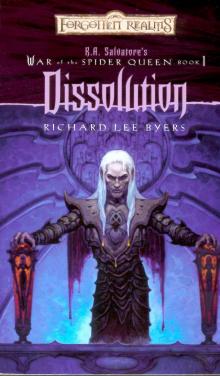 Dissolution
Dissolution Arkham Horror- Ire of the Void
Arkham Horror- Ire of the Void The Haunted Lands: Book II - Undead
The Haunted Lands: Book II - Undead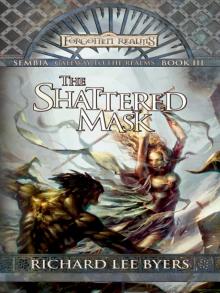 The Shattered Mask
The Shattered Mask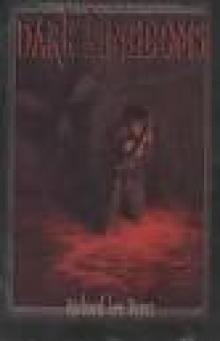 Dark Kingdoms
Dark Kingdoms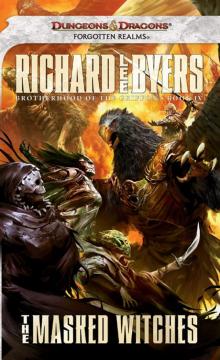 The Masked Witches: Brotherhood of the Griffon, Book IV
The Masked Witches: Brotherhood of the Griffon, Book IV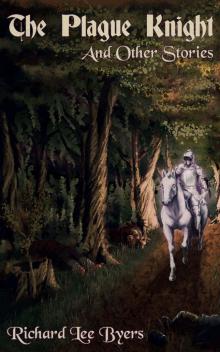 The Plague Knight and Other Stories
The Plague Knight and Other Stories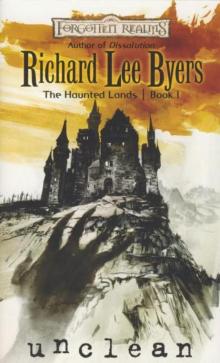 Unclean: The Haunted Lands
Unclean: The Haunted Lands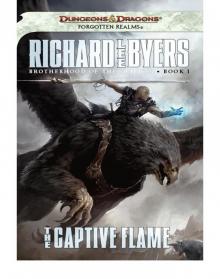 The Captive Flame: Brotherhood of the Griffon • Book 1
The Captive Flame: Brotherhood of the Griffon • Book 1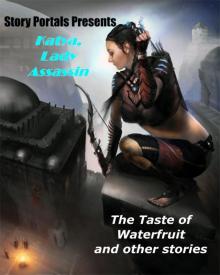 The Taste of Waterfruit and Other Stories (Story Portals)
The Taste of Waterfruit and Other Stories (Story Portals)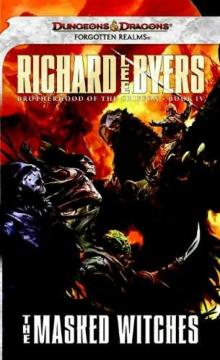 The masked witches botg-4
The masked witches botg-4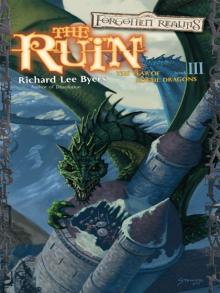 The Ruin
The Ruin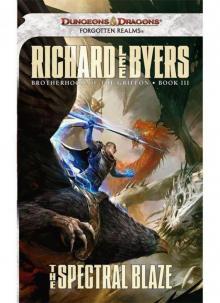 The Spectral Blaze botg-3
The Spectral Blaze botg-3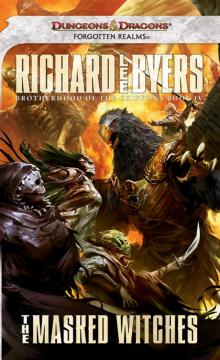 The Masked Witches
The Masked Witches Blind God's bluff bf-1
Blind God's bluff bf-1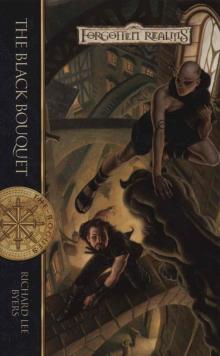 The Black Bouquet r-2
The Black Bouquet r-2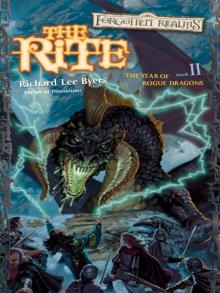 The Rite
The Rite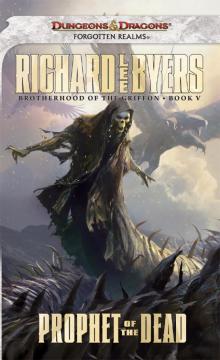 Prophet of the Dead: Forgotten Realms
Prophet of the Dead: Forgotten Realms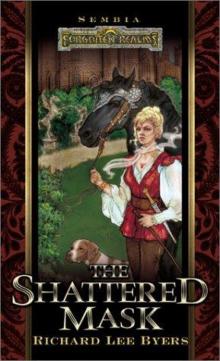 The Shattered Mask s-3
The Shattered Mask s-3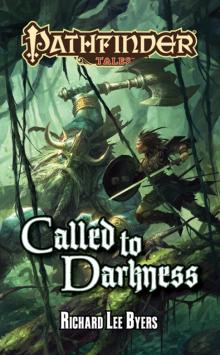 Called to Darkness
Called to Darkness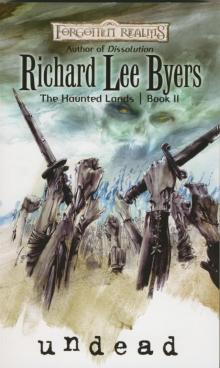 Undead hl-2
Undead hl-2 Blind God's Bluff: A Billy Fox Novel
Blind God's Bluff: A Billy Fox Novel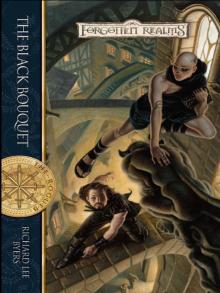 The Black Bouquet
The Black Bouquet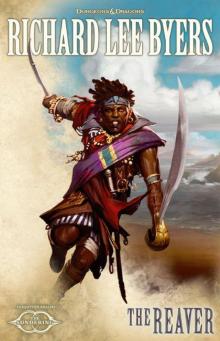 The Reaver
The Reaver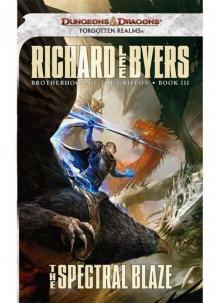 The Spectral Blaze: A Forgotten Realms Novel
The Spectral Blaze: A Forgotten Realms Novel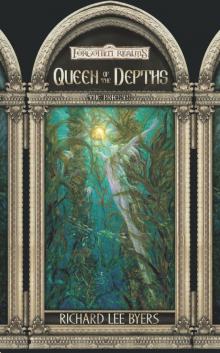 Queen of the Depths
Queen of the Depths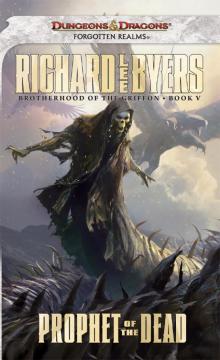 Prophet of the Dead botg-5
Prophet of the Dead botg-5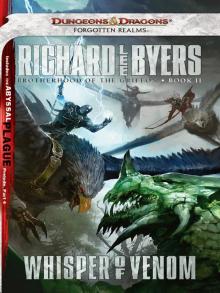 Whisper of Venom: Brotherhood of the Griffon, Book II
Whisper of Venom: Brotherhood of the Griffon, Book II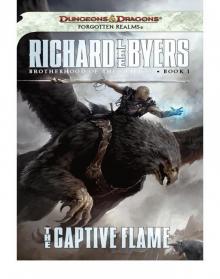 The Captive Flame botg-1
The Captive Flame botg-1 The Haunted Lands: Book III - Unholy
The Haunted Lands: Book III - Unholy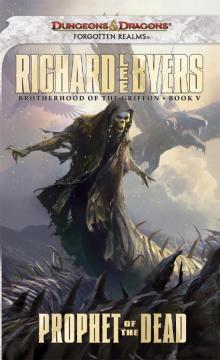 Prophet of the Dead
Prophet of the Dead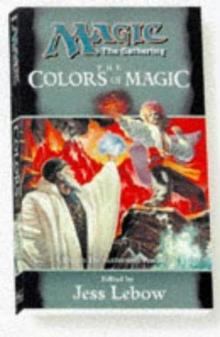 The Colors of Magic Anthology (magic: the gathering)
The Colors of Magic Anthology (magic: the gathering)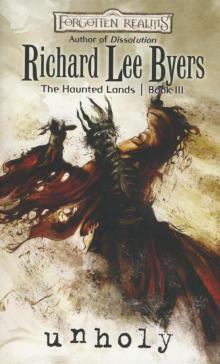 Unholy hl-3
Unholy hl-3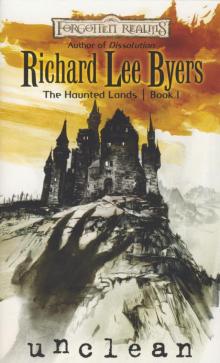 Unclean hl-1
Unclean hl-1 Blind God's Bluff
Blind God's Bluff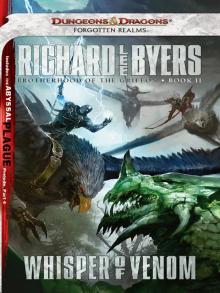 Whisper of Venom botg-2
Whisper of Venom botg-2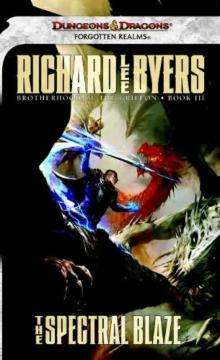 The Spectral Blaze
The Spectral Blaze